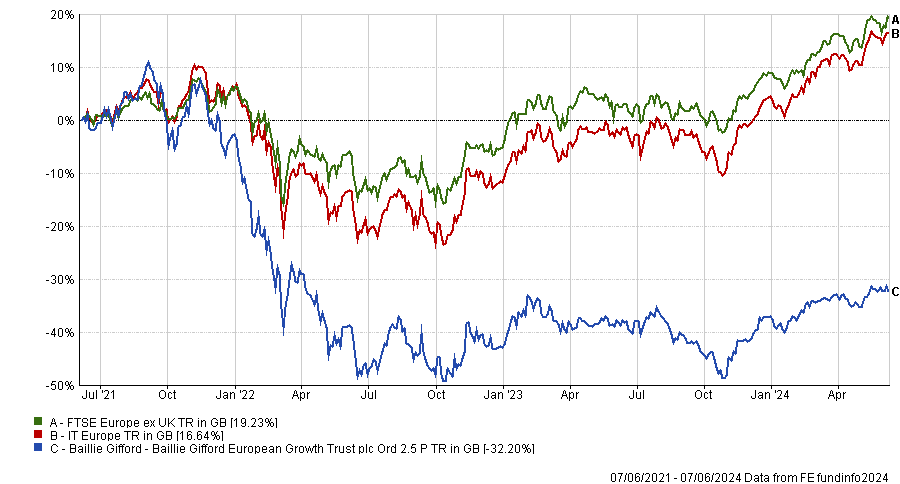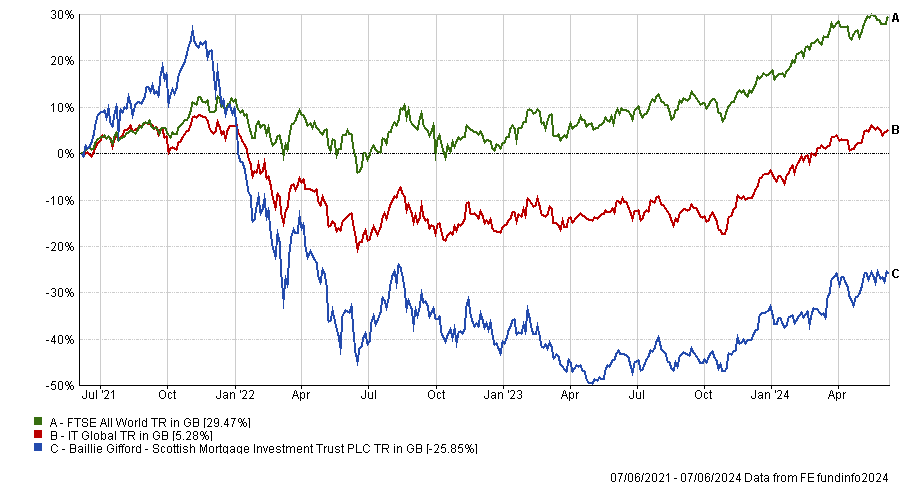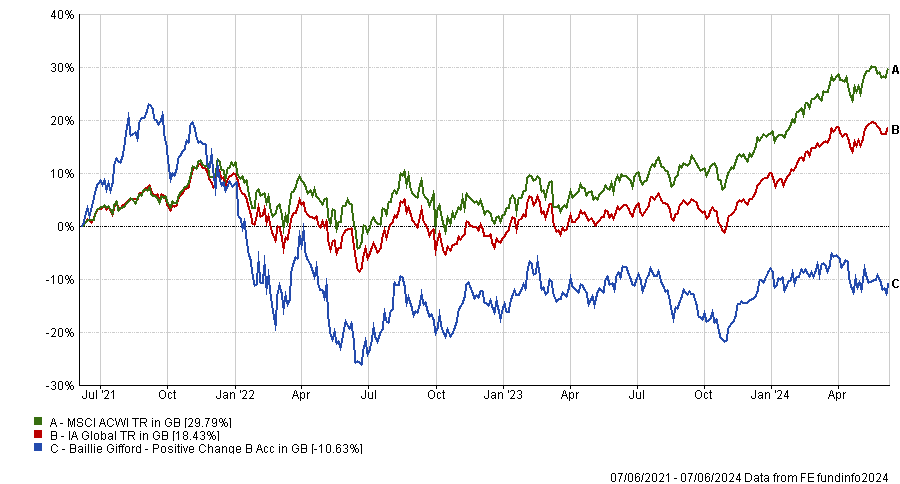Interest rate increases and China’s slowdown have weighed on yields over the past few years.
Edinburgh-based Baillie Gifford has had a torrid time of late, with only one portfolio among its 46 investment funds and trusts delivering top quartile performance in their respective sectors over the past three years.
The Schiehallion Fund was the only one to achieve the feat, despite suffering a 47.5% loss; most trusts in the IT growth capital sector plummeted further.
Only two other portfolios outperformed their sectors: the Baillie Gifford Responsible Global Equity Income open-ended fund and Baillie Gifford China Growth Trust outperformed the IA Global Equity Income and IT China/Greater China sectors respectively. The latter, however, only has three constituents.
As a result, company officials have admitted that mistakes were made over the past three years. Key areas that have impacted performance are highlighted below.
Inflation and interest rates
One of the biggest impacts on Baillie Gifford’s suite of growth-oriented funds has been interest rates, which have soared in recent years to combat significantly higher-than-expected inflation.
Chris Davies, co-director of the Baillie Gifford European Growth Trust, said this was a particularly important factor in Europe, where inflation figures are reaching double digits in some countries.
“If we go back to 2022, we came into that year with a portfolio that was probably set up to perform much better in an environment where rates remained low. That was something we’ve been open about and it was a mistake. We could have been more forward about it,” he said.
“Anyway, there was some endemic inflation in the system in the wake of the pandemic, but when Russia suddenly invaded Ukraine, it took off and with that, interest rates rose rapidly, as did discount rates.”
Performance of trust compared to the sector over 3 years

Source: FE Analytics
The trust’s overweighting in mid- and small-cap companies, which today make up around 40% of the portfolio, was “battered” and “battered” during 2022, he admitted.
Lawrence Burns, deputy manager of the Scottish Mortgage Investment Trust, said that if he had had “more insight” into the interest rate headwinds the trust was facing, he would have taken steps “on the margin” to limit losses, but the portfolio still looks very similar to the current ones.
“We are investors in long-term growth companies. They will always be under pressure if there is a substantial increase in interest rates. But as we went through that period, we were pretty clear that what we thought mattered in the long term was (more than interest rates) that the business worked and was successful,” he said.
Burns admitted there were some factors the team could have looked at more, such as companies with higher capital requirements or more debt, noting they could have been “more in tune” and “a little more alert” that the macro environment was changing. .
Performance of trust compared to the sector over 3 years

Source: FE Analytics
Porcelain
Another area that held back Scottish Mortgage’s profitability was China, where the market has been hit hard in recent years due to geopolitical concerns. The MSCI China index, for example, is down 34.8% in the last three years.
“If we had incorporated some of the geopolitical tensions and change in the domestic regulatory environment that largely began around ANT’s attempted IPO, we probably would have (implemented) a higher bar for Chinese holdings sooner,” Burns said .
The trust has since reduced its exposure to Chinese equities from 25% to 10%, although the deputy director noted that he is still “very happy to own companies in China.”
Stock selection
For Baillie Gifford Positive Change, two factors (in addition to those mentioned above) have affected profitability. The first is an underweight to the Magnificent Seven.
Rosie Rankin, investment specialist at the fund, said: “What has been particularly unhelpful to Positive Change’s relative performance over the last six to 12 months has been the incredible performance we have seen in a very concentrated number of stocks – the Seven Magnificent. – to which we actually have very low exposure.”
Fund performance versus sector over 3 years
Source: FE Analytics
Another is “execution risk,” he added, as some companies fail to match the ambition of their management teams.
Instead, managers have “learned lessons” from recent years, especially around the risk and “financial resilience” of stocks within the portfolio.
“We have a wide range of companies, from steady growth stocks like Deere with a long history, but also innovative startups. We want that balance,” he said.
Future headwinds
Lastly, Burns said he and senior manager Tom Slater have been looking ahead for potential headwinds and highlighted artificial intelligence (AI) as an area where investors can expect to see some volatility.
“There will be headwinds in the future. It won’t be easy for us over the next 20 years. At some point there may be an air pocket in AI demand. “There has been a lot of investment in AI hardware, but whether that matches demand as people figure out how to use them at scale remains to be seen,” said the Scottish Mortgage manager.
“Others include geopolitical tensions and what that means around the world. We’ve considered potential new holdings (and asked) what do we want in a more volatile world? Ultimately, we are trying to own and support the companies that are best positioned to navigate that future.”



